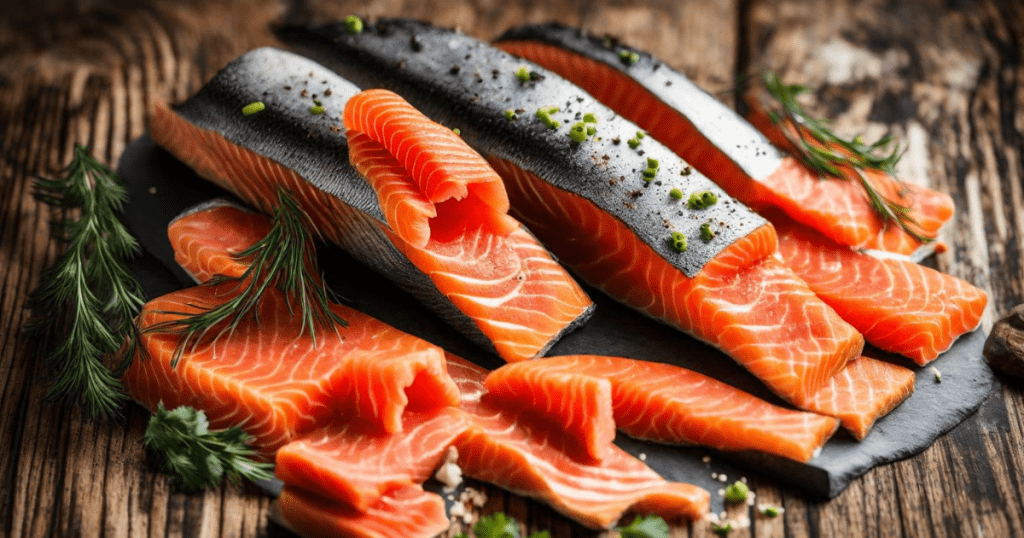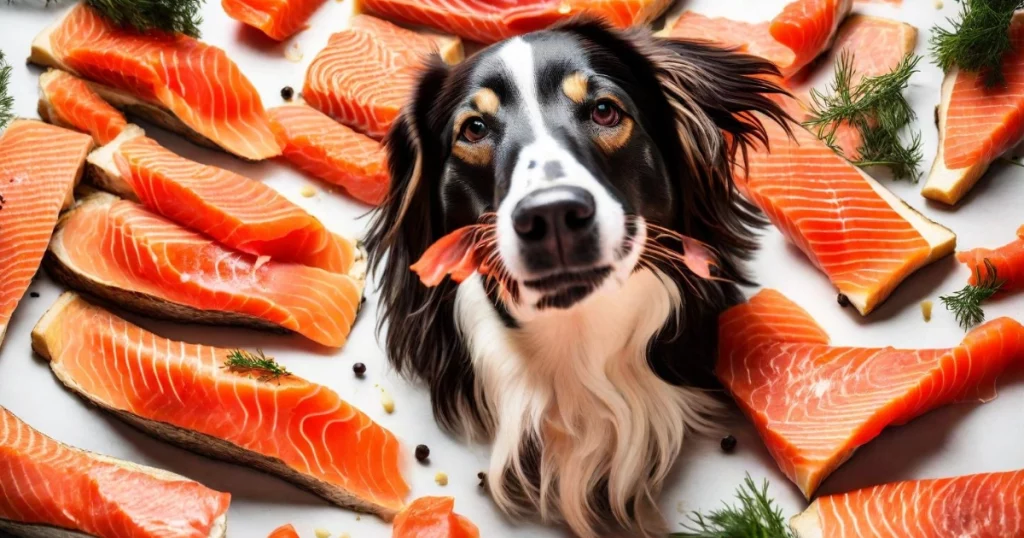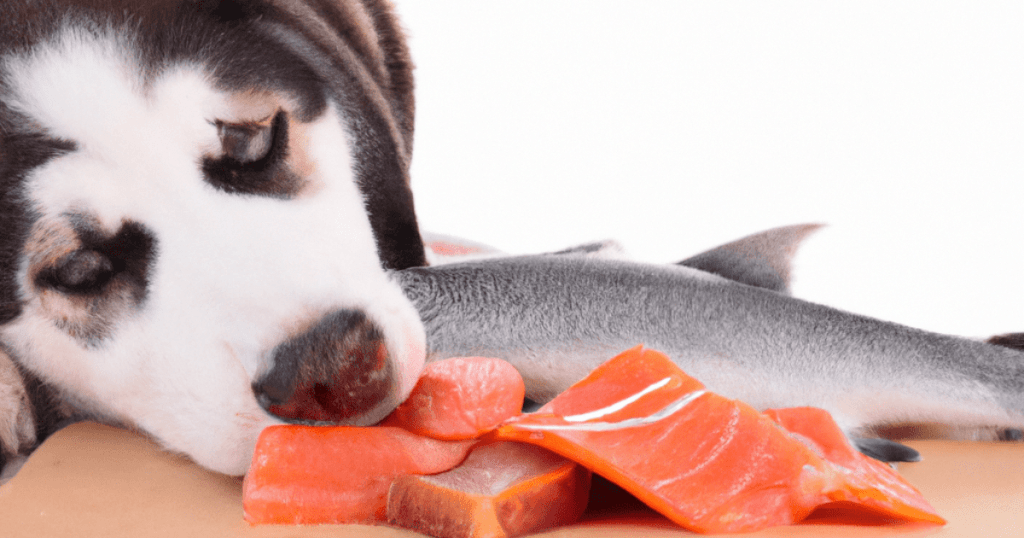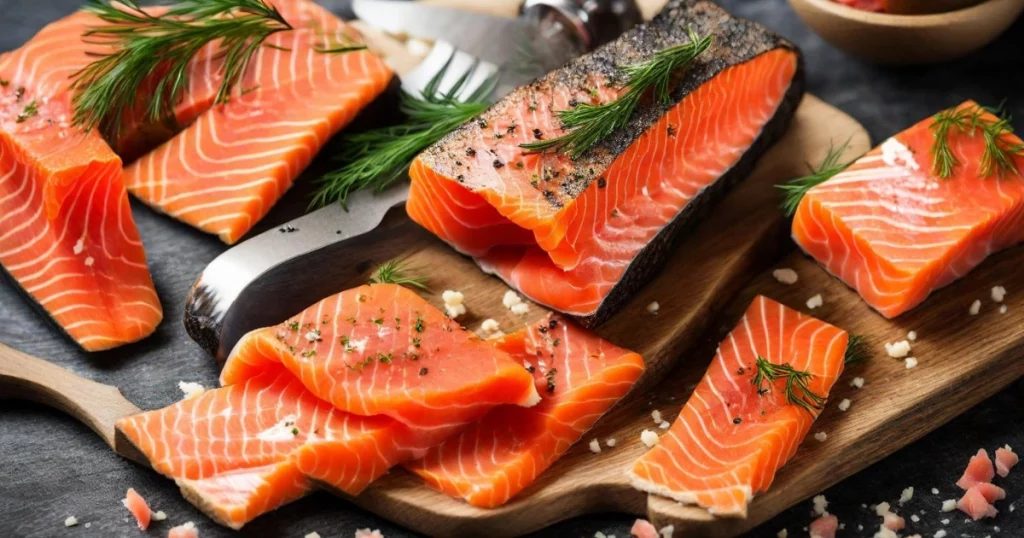Ah, Dogs Eat Smoked Salmon. It’s a delicacy for many humans, often finding its way onto the breakfast table, mingling in sushi, or adorning a cream cheese bagel. But when Dogs Eat Smoked Salmon Fido starts salivating and throwing you those puppy-dog eyes, the question that immediately springs to mind is, “Can dogs eat smoked salmon?”
Is Dogs Eat Smoked Salmon Safe?
Well, let’s dive right in. Smoked salmon isn’t the best choice for Dogs Eat Smoked Salmon. Unlike us, our four-legged friends can’t process certain foods in the same way. While salmon is generally a good protein source, when it comes to the smoked variety, it’s best to err on the side of caution.
Why Smoked Salmon Can be a No-Go

Hold your horses before you start sharing your gourmet feast! Smoked salmon often contains an array of spices and salt, which are no Bueno for Dogs Eat Smoked Salmon. High sodium levels can lead to salt poisoning or pancreatitis in canines. Additionally, the smoking process doesn’t kill parasites like it does in cooked salmon, potentially leading to unpleasant issues down the road.
Alternative Fishy Options for Your Pet
If you’re keen on feeding your Dogs Eat Smoked Salmon. some fish, consider alternatives that are much safer. Cooked salmon, cooked whitefish, and even some fish-based dog food are excellent choices. Make sure they’re well-cooked, unseasoned, and boneless. The benefits? Omega-3 fatty acids, good protein, and essential vitamins! Just keep the portions small and consult your vet for the green light.
Symptoms to Watch Out For
So, you slipped up and Dogs Eat Smoked Salmon snagged a slice of that smoked salmon off the table? Don’t hit the panic button just yet. Keep an eye out for symptoms such as vomiting, diarrhea, or excessive thirst. Any of these signs should be a red flag, compelling an immediate trip to the vet’s office.
Consulting the Professionals
For the best advice tailored to your furry friend, consult your local veterinarian. Our general advice doesn’t replace professional guidance. Different breeds and individual dogs may have unique dietary requirements and tolerances, so a quick check-up is always a good idea before making any dietary changes.
The Science Behind It: Nutritional Components in Salmon

Now, let’s break it down further. Omega-3 fatty acids, protein, and important amino acids are all abundant in salmon. This is a veritable goldmine of health advantages for people. But, the additional salt and spices in smoked salmon can negate these benefits for our four-legged companions.
Risks of Allergies and Sensitivities
Dogs can be allergic to anything, just like humans. Fish allergies are relatively rare but still possible. If your pooch has never had fish before, it’s crucial to start with a small, controlled amount of a safer option like cooked, plain salmon. Monitor your dog for any signs of an allergic reaction, such as itching, unusual aggressiveness, or skin rashes.
Portion Size Matters

Even if you opt for a safer, cooked fish option, portion control is key. Feeding your dog too much of anything, even if it’s healthy, can lead to weight gain or digestive issues. As a rule of thumb, treats or “human food” should not make up more than 10% of your dog’s daily caloric intake.
Is Canned Salmon a Good Alternative?
Canned salmon can be a convenient and quick option but tread carefully. Always choose varieties that are in water rather than oil and without any added salt or spices. Read the label carefully to ensure it doesn’t contain onions or garlic, as these are toxic to Dogs Eat Smoked Salmon. If the ingredients check out, canned salmon can be a suitable treat in small quantities.
What About Sushi?

Well, you might be tempted to share a piece of that delicious sushi roll, but let’s pump the brakes. Most sushi contains additional ingredients like avocado, which is toxic to Dogs Eat Smoked Salmon, and rice, which can add unnecessary calories. Not to mention, the wasabi and soy sauce are far too spicy and salty for your pooch.
Homemade Dog-Friendly Fish Recipes
If you’re feeling particularly ambitious, why not whip up some homemade fish dishes for your Dogs Eat Smoked Salmon? Simple recipes include a mixture of cooked fish, some dog-friendly vegetables like carrots or peas, and a base of brown rice or sweet potatoes. Blend them together for a nutritious and delicious doggy dinner.
In Summary: Keep That Smoked Salmon on Your Plate, Not Theirs
We understand that you want to share everything good in life with your Dogs Eat Smoked Salmon. But not everything we like is good for our canine companions. Smoked salmon poses too many risks to warrant feeding it to your dog. Stick with safer, vet-approved options and keep that delicacy for yourself. Your dog’s health will thank you in the long run.
The Role of Treats in a Dog’s Diet

We all love spoiling our pets with treats, but it’s crucial to remember that treats are just that—extras, not essentials. While it’s tempting to slip them a piece of smoked salmon or another culinary delight, doing so can inadvertently tip the scales of their balanced diet. When considering adding any treat to your Dogs Eat Smoked Salmon, regimen, especially something as rich as salmon, it’s vital to weigh it against their daily nutritional needs.
What Do Vets Recommend?
Many veterinarians recommend sticking to dog-specific treats that are designed with canine nutrition in mind. These treats often come fortified with nutrients that are beneficial for your Dogs Eat Smoked Salmon, without the risk factors associated with human foods. From dental chews to dog biscuits rich in fiber and protein, there are a plethora of options that not only satisfy your dog’s taste buds but also contribute to their well-being.
A Word on Food Safety
No matter what you’re feeding your pet, food safety should never be compromised. Always ensure that any fish you offer has been properly cooked and is free from bones, as these can be a choking hazard. Never offer raw fish due to the risk of parasites or bacterial contamination. In short, if you wouldn’t eat it yourself, don’t give it to your dog.
The Final Verdict: Leave Smoked Salmon Off the Doggy Menu

To wrap it all up, smoked salmon is a culinary treat best enjoyed by humans, not dogs. The risks associated with feeding smoked salmon to your furry friend far outweigh any potential benefits. From the high sodium content to the potential for parasite transmission, the red flags are just too numerous to ignore.
Stick to safer, dog-friendly options and always consult your veterinarian before introducing new foods into your pet’s diet. Your dog’s health is invaluable, and making informed decisions about what they eat is one of the best ways to show your love and care.
Pros and Cons of Feeding Fish to Dogs
Given that we’ve focused on why smoked salmon isn’t suitable for dogs, it would be helpful to examine the broader landscape of feeding fish to your canine companion. Fish can be a polarizing topic, so let’s delve into the pros and cons.
Pros of Feeding Fish to Dogs
Omega-3 fatty acid-rich
Omega-3 fatty acids are abundant in fish like mackerel and salmon. These can help your dog’s skin and hair look better, reduce inflammation, and even sharpen their minds.
High-Quality Protein Source
Fish provides a lean, easily digestible source of protein, vital for muscle development and maintenance.
Low in Saturated Fats
Since fish typically contains few harmful fats, it is a healthy choice for dogs that need to control their weight or are predisposed to cardiac problems.
Contains vital minerals and vitamins
Fish is a wonderful source of important vitamins and minerals including zinc, iron, and magnesium as well as key nutrients like vitamin D and B vitamins. These support general health and well-being.
Cons of Feeding Fish to Dogs
Risk of Contaminants
Fish can contain harmful substances like mercury, which can accumulate in your dog’s body over time and lead to health problems.
Other Articles
- Why Choose The Pride Dog Food for Your Furry Best Friend?
- Waterproof Harness Dog: Keeping Your Pup Dry and Comfortable
- Showtime Dog Food: A Comprehensive Review
- 44lb Pedigree Dog Food: Real Reviews from Happy Dog Owners
- Hunter Dog Harness: Ultimate Guide to Safety & Style
Allergy Concerns
Though relatively rare, some dogs can be allergic to fish, leading to skin irritations, digestive issues, and other symptoms.
Potential for Bone Ingestion
Fish bones are small and can be difficult to remove entirely. If ingested, they pose a choking hazard and can cause internal injuries.
Quality and Preparation Matter
Not all fish are made the same. The preparation method, such as smoking, cooking, or serving it raw, can have a big impact on how safe and suitable it is for dogs.
In Summary: Weigh the Risks and Rewards Carefully
Feeding fish to your dog isn’t a straightforward decision. While it offers many health benefits, it comes with its own set of risks that can’t be ignored. As with any change in your dog’s diet, consult your vet for tailored advice. After all, what works wonders for one dog may not be appropriate for another. Exercise caution and make educated choices for the betterment of your furry friend’s health.
Final Thoughts: To Feed or Not to Feed?
In a nutshell, while salmon in its basic, cooked form can offer some great benefits to Dogs Eat Smoked Salmon, the smoked variety should be avoided. Your pet’s health is not something to gamble on, so when in doubt, always consult a professional. And remember, every dog is different; what works for one may not work for another.
FAQ
| Question | Answer |
|---|---|
| Can dogs eat smoked salmon? | No, it’s not recommended due to high salt content and potential parasites. |
| What are the symptoms if a dog eats smoked salmon? | Vomiting, diarrhea, and excessive thirst are common symptoms. |
| Is cooked salmon safe for dogs? | Yes, as long as it’s boneless, unseasoned, and well-cooked. |
| Can dogs have canned salmon? | Yes, but choose varieties in water, not oil, and without added salt or spices. |
| Are fish-based dog foods a good alternative? | Yes, they are formulated to provide balanced nutrition for dogs. |
| What advantages does fish have for dogs? | Omega-3 fatty acids, superior protein, and vital vitamins and minerals. |
| Can dogs be allergic to fish? | Yes, but it’s relatively rare. Watch for symptoms like itching or skin rashes. |
| Is fish a low-fat option for dogs? | Generally, yes. Fish is usually low in saturated fats. |
| Do I need to consult a vet before adding fish to my dog’s diet? | Yes, it’s always a good idea to consult your vet for tailored advice. |
| How much fish can I feed my dog? | Treats or “human food” should make up no more than 10% of your dog’s daily caloric intake. |

